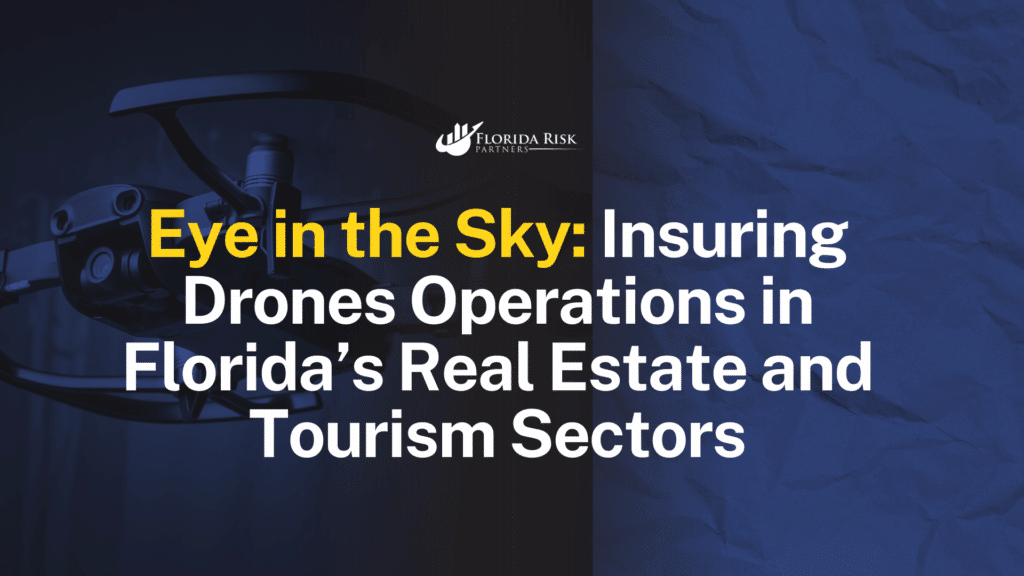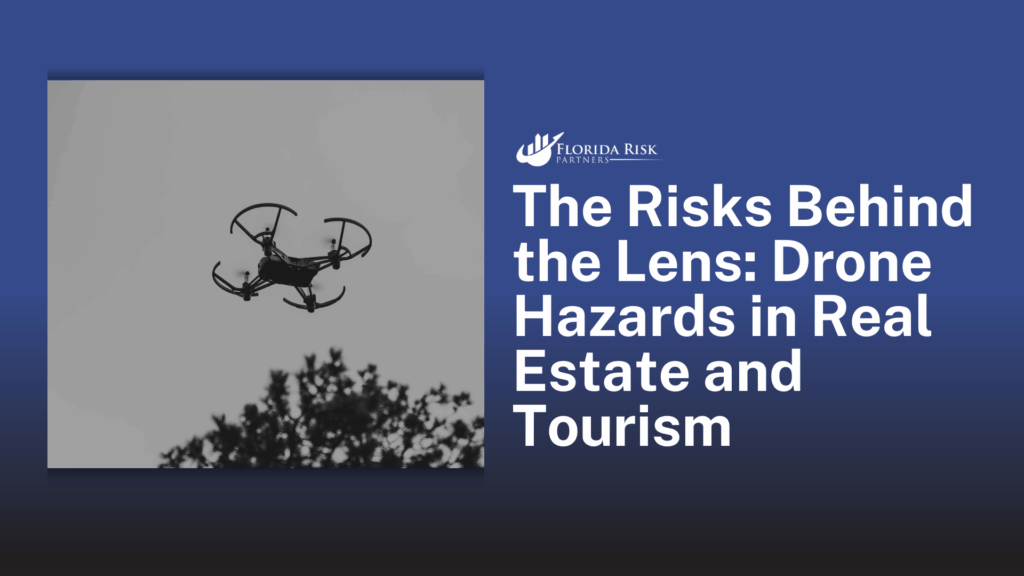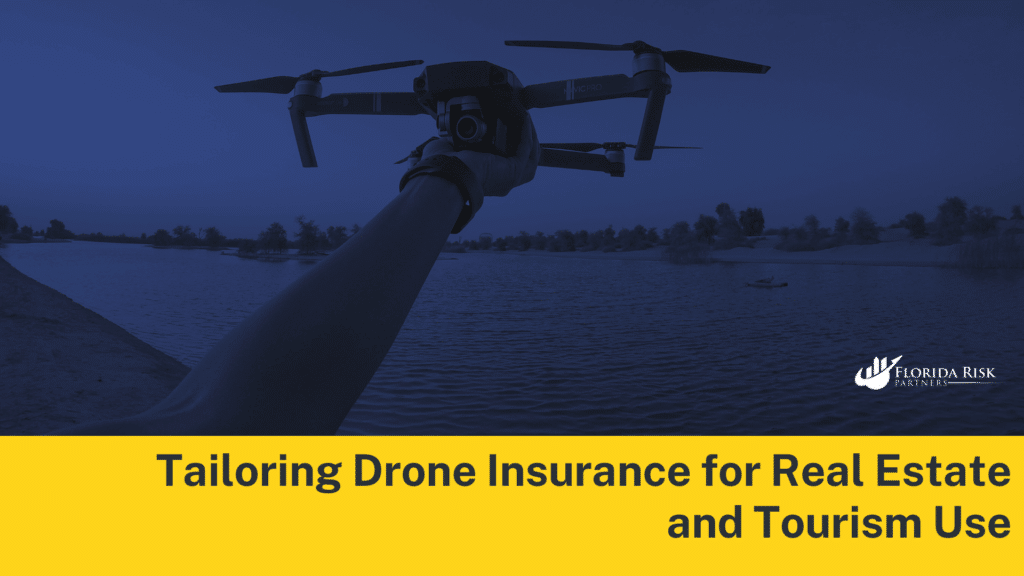-
Main Office: 1434 E. Bloomingdale Ave Valrico, FL 33596-6110
-
Phone: (888) 601-6660
-
Email: info@floridariskpartners.com

Florida is more than just sunshine and palm trees—it’s one of the most dynamic real estate markets and top tourist destinations in the country. From beachfront resorts in Destin to luxury condos in Miami, the demand for stunning visuals is sky-high. That’s where drones come in. Unmanned aerial vehicles (UAVs) are now essential tools for real estate agents, property developers, marketing professionals, and tourism operators. With just a few minutes of flight time, a drone can capture breathtaking aerial imagery, highlight property features, and give out-of-town clients a view they would otherwise miss.
But while drone technology opens new doors for creativity and engagement, it also opens the door to risk. Whether you’re shooting a promo video for a vacation rental or capturing a high-rise condo’s rooftop pool, a drone crash, privacy violation, or FAA misstep can bring legal trouble and financial loss. That’s why understanding the importance of drone insurance for real estate and tourism in Florida is crucial for professionals using this technology to promote their businesses.
In this article, we’ll explore how drones are transforming Florida’s real estate and tourism landscapes, the legal and liability exposures these sectors face, and how specialized real estate drone insurance in Florida provides critical protection.
Drones: The New Standard in Florida Property and Hospitality Marketing
Visual marketing sells. And nowhere is this more true than in the Florida housing and hospitality industries. In today’s hyper-competitive markets, buyers and renters expect immersive experiences before they ever step foot on a property. Drone videos and aerial photography help agents and marketers:
- Showcase expansive properties, waterfront locations, and unique architecture
- Create virtual tours for out-of-state buyers or seasonal renters
- Highlight proximity to amenities like beaches, golf courses, parks, or nightlife
- Offer dramatic reveal shots in promotional materials
Similarly, the tourism industry uses drones for everything from capturing scenic resort views and filming events to documenting excursions and producing travel content for social media. In places like Key West, St. Augustine, Clearwater, and Orlando, drone footage isn’t just an enhancement—it’s a business necessity.
However, all of this activity takes place in environments that are often densely populated, highly regulated, and filled with obstacles—making Florida tourism drone liability a real concern.
The Risks Behind the Lens: Drone Hazards in Real Estate and Tourism
While a well-executed drone shot can help land a sale or book a guest, an error in flight judgment can land you in court. The risks associated with drone use in Florida’s real estate and tourism sectors are both varied and significant. Let’s break them down.
Property Damage from Drone Incidents
Imagine filming a high-end real estate listing with a drone when a sudden gust of wind sends it into a neighbor’s window—or worse, a parked luxury vehicle in the driveway. In the tourism space, drones flown near resorts, marinas, or historic landmarks may collide with structures, signage, or other infrastructure. The result? Costly property damage and a potential lawsuit.
Because Florida is prone to sudden weather changes—especially near the coasts—flying drones without careful planning can easily result in a crash. If you don’t have proper Florida aerial photography insurance, you’re on the hook for repairs, replacements, or restitution.

Bodily Injury to Bystanders
Both the real estate and tourism sectors frequently operate in or around populated areas. Open houses, home tours, resort pools, beach events, or walking tours often feature people walking in and out of camera range. A drone that falls from 100 feet or loses connection mid-flight could cause serious injury to an unsuspecting bystander.
This kind of bodily injury claim could trigger expensive medical bills, lost wages, and even litigation—especially in a state like Florida, where personal injury attorneys are never hard to find. Having drone liability insurance in Florida that specifically includes bodily injury protection is absolutely essential.
Invasion of Privacy and Legal Claims
One of the most underestimated risks of using drones for marketing is the violation of privacy laws, particularly in a state like Florida that enforces strict aerial surveillance rules. The Freedom from Unwarranted Surveillance Act makes it illegal to capture images of people on private property without consent—even if those people are not the intended subjects.
A drone filming a vacation home near a public beach might inadvertently record sunbathers or residents next door. Similarly, drones filming real estate in urban settings might capture residents inside their windows or on balconies. If that footage is published, even unintentionally, it can result in a privacy lawsuit.
It’s a common misconception that if you didn’t mean to record someone, you’re safe. In Florida, intent doesn’t always matter. What matters is whether the subject had a reasonable expectation of privacy—and if they did, you could be in violation. The financial and reputational fallout of such incidents makes drone privacy liability coverage a non-negotiable element of any insurance policy.
Unlicensed or Improper Flight Operations
Both commercial and recreational drone operators must follow FAA regulations. Commercial operators—such as real estate agents or tourism marketers—are required to hold a Part 107 Remote Pilot Certificate. Flying without it not only risks federal penalties but can invalidate your insurance coverage.
Operating drones near airports, in restricted airspace, or during poor weather without appropriate waivers or precautions can also increase your exposure. Many areas of Florida, especially around major metros like Miami, Tampa, and Orlando, are near controlled airspace, military zones, or protected wildlife habitats. If you operate drones in these areas without authorization, any resulting incident could become far more serious.
Tailoring Drone Insurance for Real Estate and Tourism Use
When it comes to insuring drones used in real estate and tourism, not all policies are created equal. A generic drone policy might fall short in these high-exposure, highly visual industries. Here’s what to look for in a Florida drone insurance policy tailored for these fields.
Commercial Liability Coverage
This is the foundation of any good drone policy. It protects you from third-party claims related to property damage, bodily injury, or legal costs arising from drone-related incidents. Minimum recommended limits for real estate and tourism operators typically start at $1 million—especially if you’re working with luxury properties, resorts, or commercial clients who may require proof of coverage.

Personal and Advertising Injury Coverage
This crucial coverage protects you in the event of privacy violations, defamation, or the unauthorized use of someone’s likeness in a promotional video or ad. In both real estate and tourism marketing, where drone footage is often shared publicly, this type of risk is more common than you might think.
Hull and Payload Protection
If you’re operating high-end drones with 4K cameras, gimbals, and other payloads, you’ll want physical damage protection. This covers repair or replacement if your drone is damaged in a crash, exposed to moisture, or lost in transit.
Equipment and Ground Station Coverage
Don’t forget about the gear you use on the ground—remote controllers, tablets, charging systems, and mobile bases are all essential to your operation and can be expensive to replace. Look for policies that include equipment and ground station insurance, especially if you’re moving between listings or tourist locations frequently.
Named Insured and Certificate Holders
If you’re shooting for a real estate firm, resort, or tourist agency, they may request to be named as an additional insured on your policy. This means they also receive protection under your policy in the event of a claim related to your work. A good drone insurance provider should allow you to issue these certificates quickly and easily.
Best Practices to Reduce Drone Risks in Real Estate and Tourism
While insurance offers financial protection, reducing your risk exposure should always be the first step. Here are a few tips to fly safely and stay compliant:
- Always fly with a Part 107 license. Even if you’re just capturing simple aerial shots for a listing, the FAA considers this commercial use and requires certification.
- Use flight planning software to stay clear of restricted airspace, populated zones, or sensitive areas.
- Conduct site surveys before flying—check for power lines, birds, overhangs, or high pedestrian traffic.
- Notify local residents or property managers if you’ll be filming nearby. A heads-up can go a long way toward avoiding misunderstandings or complaints.
- Post signage or cones when filming in public or shared spaces to make your drone operations visible and reduce risk.
- Get written permission if your footage may include recognizable people or private properties not directly related to your client.
The Bottom Line: Market Smarter, But Fly Smarter Too
Drone marketing has become a powerful asset in Florida’s real estate and tourism sectors. It helps sell homes faster, attract more guests, and build excitement around properties and experiences. But with great marketing power comes great responsibility—and potential liability.
Failing to insure your drone operations exposes your business to legal costs, reputational damage, and unexpected equipment loss. But with the right real estate and tourism drone insurance policy in Florida, you’re not just protecting your drone—you’re protecting your livelihood, your brand, and your future.
Next week, we’ll take a look at recreational drone use across the Sunshine State and what everyday hobbyists need to know about managing risk—even if they’re just flying for fun. Until then, keep your footage clean, your flight paths legal, and your policies airtight.
Call Us Or
Schedule an Appointment
Select an agent below to view our online calendars and select a day and time that works best for you or call us directly at 888-601-6660. When you use our online calendars, you will receive an email with more information.



